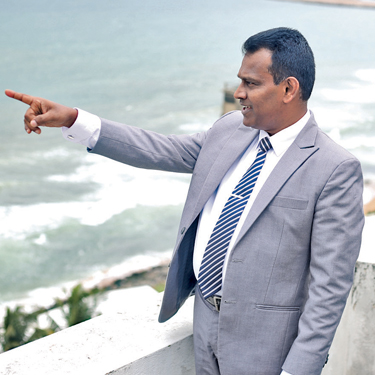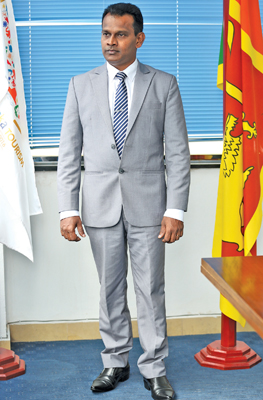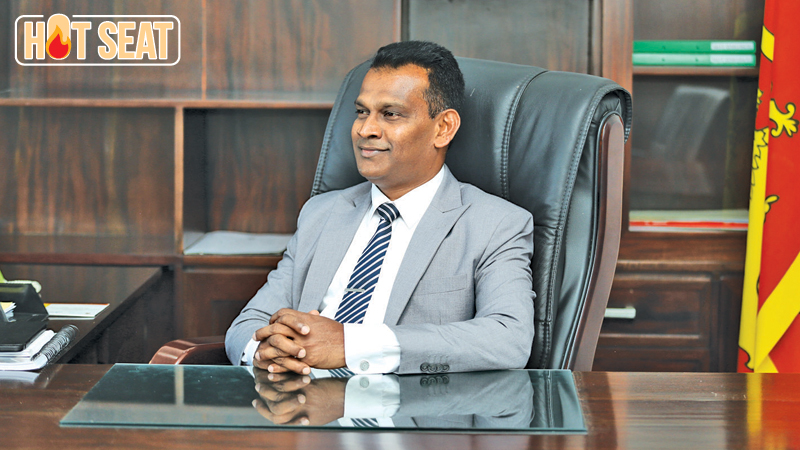The change is happening slowly, but surely. We have studied thoroughly and slowly making changes, thus there will be a gradual transformation toward an inclusive and sustainable tourism economy.
Deputy Minister of Foriegn Affairs Foriegn employement and Tourism in Sri Lanka, Prof. Ruwan Ranasinghe’s main responsibilities include the formulation and execution of sustainable tourism policies, promoting innovation in the tourism sector, and fostering international partnerships to position Sri Lanka as a premier global tourism destination.
This is no easy task given that the country looked to Tourism as the saviour, to recover from the economic doldrums that the country had fallen into, especially at the time of him taking over the daunting tasks that imposed these responsibilities and ones that came with the position.
An academic and a leading tourism strategist, known for his contributions to both education and national tourism policy development, he holds a First-Class Degree from Rajarata University in Tourism and hospitality in 2004, and an MBA (2012) and earned his Doctorate from Sichuan University, China, in 2017 in Tourism and Hospitality Management.
 In 2009, Prof. Ranasinghe introduced Sri Lanka’s first Tourism and Hospitality Management degree program at Uva Wellassana University, which was later endorsed by the United Nations World Tourism Organization (UNWTO).
In 2009, Prof. Ranasinghe introduced Sri Lanka’s first Tourism and Hospitality Management degree program at Uva Wellassana University, which was later endorsed by the United Nations World Tourism Organization (UNWTO).
Having worked in the private sector, in a leading Tourism company, Aitken Spence hotels especially on tasks that involved rebranding and costs for its transformation into Heritence Hotels, gave him the exposure he needed in the private sector, to see it all from the aspect of one working within the industry.
Hailing from Kuliapitiya Prof. Ranasinghe entered politics actively in 2017. He said he found his chosen area to represent – Uva Wellassana, very challenging with the base geographically being a stronghold of D.S. Senanayake-considered the father of the nation. However he has established his own base in Badulla, although he entered the 10th Parliament through the NPP National List.
Never a person to shirk from a question and known for unwavering attention at discussions and calm composure when questioned on even controversial subjects, his strategic vision has significantly shaped national tourism policy, including contributing to the National People’s Power (NPP) movements sustainable and inclusive tourism framework.
He has successfully led major initiatives, such as overseeing LKR 1,000 million in World Bank-funded tourism projects and coordinating Sri Lanka’s participation in the European Union-funded SES TOUR program. With over 1,000 academic citations, he is recognised among Sri Lanka’s leading tourism researchers.
Recently, Prof. Ranasinghe was honoured with a Guest Professorship at Sichuan University, China, further strengthening his international academic collaborations. As Deputy Minister, he is dedicated to advancing sustainable tourism, fostering innovation, and building global networks to elevate Sri Lanka’s status on the world tourism map.
Sunday Observer Explorer has had many Tourism experts, veterans on the Hot Seat. They have mentioned a number of key issues that ails the Tourism Industry and spoken of the potential of the country to rise to greater heights, comments that help the Industry to improve take note and take action.
Prof. Ranasinghe has been observant and takes every constructive criticism as vital and was ready to sit on the HOTSEAT himself. His perspective is interesting and important and would surely loom large in the contribution to the progress of our Tourism sector.
Q. What are the challenges to tourism in Sri Lanka as you see it ?
A. When I look at the Tourism Industry in Sri Lanka, we have some major key challengers at the moment, number one is as you said Governance, we are working with what has have been established all these structures in the 1960’s and the Parliament Act of the 1960’s was with terms and conditions to address the issues then. But we are now in 2025.
We now need a totally different, flexible, effective, technology driven approach to answer the questions today. Therefore we need to definitely change the Governance structure.
Sri Lanka Tourism is backward in Digitalisation
Then another challenge is Digitalisation. For some reason Sri Lanka in general and the public sector in perticular, we have not followed the digitalisation sufficiently. May it be the harbour operations, airlines, trains, public transport, airport- in all key areas connected with Tourism we are not using sufficient technology. For some reason, it has not happened. I would say when you compare to countries like Korea, China and Japan we are 30 years behind. We need to digitalise the Tourism sector.
For example, the largest operator in Europe- TOI, plan their tours using Artificial Intelligence. When they plan a tour for me- AI will generate the tours, which is called the regenerative AI. That means what is available in the network they will use and analyse. As far as Sri Lanka is concerned, for instance Uva Paranagama is a beautiful area, a tourist destination but we do not have digital content. We need to develop digital contents and upload them to Cyberspace so that future tourism will be beneficial to us. Otherwise people will use AI. AI does not understand anything in Sri Lanka. Why – because we don’t have digital content.
Sutainability
Another challenge is sustainability in terms of ecology, social and cultural sustainability and the environmental sustainability.
About the Ecology, I don’t need to give many details about what is happening in Yala, Mirissa whale watching, even in Sigiriya. These are not sustainable. We cannot go on like this.
In my view from late 1960’s Tourism is secluded to few areas, few companies, few cities. But this we need to bring into the larger communities. This is a challenge. If we need to really develop the country through tourism we need to make ordinary people involved and engaged in Tourism. Community engagement is required in rural and remote areas like Deniyaye, Uve Paranegama, Haliela. We need to give economic benefits to those people. That is our vision. Inclusive economic tourism means that.
Impacts
 We need to manage the impacts. There will be Economic impacts, let them be positive or negative, we need to manage them positively as well as minimise the negative ones. Then the Environmental impacts-; climate change, transportation, development projects involving deforestation, water issues.
We need to manage the impacts. There will be Economic impacts, let them be positive or negative, we need to manage them positively as well as minimise the negative ones. Then the Environmental impacts-; climate change, transportation, development projects involving deforestation, water issues.
Yesterday I had a complaint from the divisional coordination committee in Elle. A hotel’s water usage was hampering the agriculturists in the village. We need to have a kind of balance. These are major challengers that we have for tourism development. In the next 5 years we can address these challenges.
Q. What progress do you see? Are you happy with the progress so far?
A. No sooner we took office we ran for Local Govt. Elections. Therefore we have had to use up some of our time for those matters.
The Change is happening slowly, but surely. We have studied thoroughly and slowly making changes, thus there will be a gradual transformation towards an inclusive and sustainable tourism economy.
Speaking of systems and structures, people have got used to a system. It is tough to change our people who have been used to this system for six to seven decades. It’s not practical to expect fast results. We would indeed make necessary radical fast changes when required.
Centuries old attitudes cannot be fast tracked to change overnight into our vision. This is not an excuse, but an analytical conclusion. We are trying to make this turn as flexible as possible. But if necessary we are willing to take tough decisions to ensure that the people fall in line with a new system. It is only after two to three years we will be able to see the difference. Initially it’s very hard. It’s not one group of people. We are responsible for all stake holders and will need to take a holistic approach to every action. It will take a bit of time, but the change has started.
Q. There is a group controlling certain tourist areas, almost a Mafia, especially in the South that is hampering Tourism there, what action is being taken for that?
A. Yes, There is a kind of mafia, where transportation of tourists are being controlled. We are very strict and enforce the law accordingly. We are aware in the Galle town an Uber vehicle cannot go. Outside vehicles are not allowed to certain areas. Top international car rental companies are unable to operate.
However, there are two sides to the story too. The locals involved in transportation are at a risk of losing their livelihood. Having said that, it does not mean that we have to entertain the three- wheel mafia. We have started a dialogue with the stakeholders. We met with societies from the South. We have to introduce a mechanism for this. We have told the aligned agencies to come up with a mechanism.
Q. There has been a constant complaint that the Govt. bodies related to Tourism in different Ministries are not cooperating in working together and this has stalled the progress in uniting and working together toward the set of common goals
A. Individually, we talk to those relevant however, there needs to be a dialogue among all parties connected to Tourism. We have put forward a Cabinet Paper and is in discussion to appoint a commission to get the powers to make these changes. This will help to alter the act. There is an extensive process taking place now. Once the Act is finalised it would go to Parliament. There is a long procedure to get to that point. It will take at least two years as I see to get all the approvals required to setup a comission. All these bodies will have to fall in line.
Q. An advisory committee comprising of representing all key stake holders was appointed, what progress have been made?
A. We meet every month and discuss the issues facing the Industry and get their expert views and advice and take necessary action that they propose.
Last week in Knuckles Range they formed an organisation called Knuckles Tour Guides. Even Govt. officials are in this circle. They are managing and working well. We are forming destination management organisations – we can set up such through a Cabinet Paper. Before making amendments to the Act, we can make certain changes to progress.
For example, we have only one Ministry Secretary for Foreign Affairs and Tourism. That is a heavy task. I envisage proposing in having an Additional Secretary to deal with only Tourism. Therefore taking such timely decisions to expedite the process, administrative changes such as a separate secretary for Tourism, we can do, and is being done.
Q. There is united marketing Campaign that was spoken of, if you can enlighten us on that?
A. The previous Government started the campaign “Sri Lanka – you will come back for more”.
After carefully studying this, of whatever that was left behind, we find that the Digital marketing campaign has very serious procurement problems. It is a campaign that involves a couple of billions. It also does not involved just one entity, it is broken into pieces. That is not all. Payments have been done half way. This makes it very difficult to go for a fresh one.
I am not in favour of the continuity of the old campaign. It is not easy to reverse.
There is pressure brought upon demanding to expedite a marketing campaign by the very people who are the beneficiaries of the old one- hoping that in hastiness we will let the old one run. I will not entertain that. We cannot proceed with that one.
We have to clear the financial irregularities of the old one – for which some will even have to go to court.
To go for a fresh one this old issue has to be sorted. Some did not realise the gravity and the processing time it will take. It will take at least a year to clear the table to lay the fresh one.
We have put forward a paper to appoint a Branding Committee that will comprise of branding marketing communication experts, financial experts appointed by the Minister who can guide us, and then hold a Branding conference in 2 months. Creating a brand for a country takes a lot of time and it has to be solid. This time it will be one that can last 10 to 15 years, not change every three to six months as the previous regimes have done.






